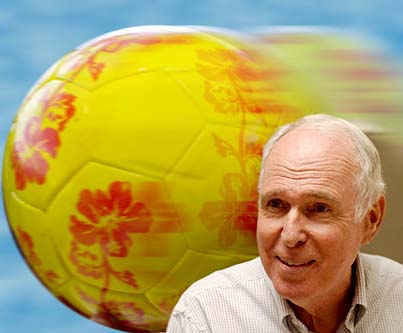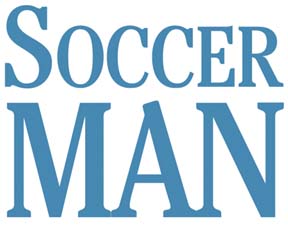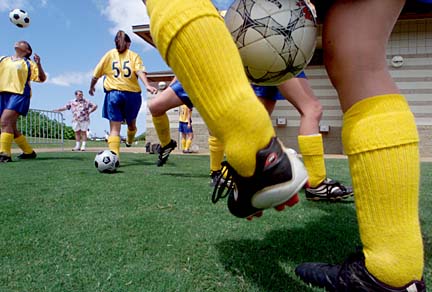

|
First Sunday Mark Coleman |
PHOTO ILLUSTRATION BY BRYANT FUKUTOMI / BFUKUTOMI@STARBULLETIN.COM
Jack Sullivan never was much of a soccer player, but he has been influential in popularizing the sport in Hawaii.
Jack Sullivan wants you to know he is not the father of soccer in Hawaii. In fact, he said nobody is the father of soccer here, nor is there a mother of soccer. Instead, he said, "everybody who's ever served as a coach or washed their kids' soccer uniforms after practice or a game deserves credit."
Still, Mr. Soccer or not, Sullivan has been a driving force behind the game's popularity here. From soccer's beginning as an organized sport in Hawaii, Sullivan has served as a coach, organizer, manager, fund-raiser and publicity director for numerous leagues and tournaments. He also has been a soccer commentator on radio and TV and in local sports publications.
Partly because of his efforts, thousands play the sport throughout the state, and companies such as Meadow Gold Dairies and Outrigger Hotels spend thousands of dollars a year to promote soccer activities. In the three years since the Waipio soccer fields were opened, tournaments there have brought millions of dollars into the state economy.
Besides being active in soccer, Sullivan operates Hawaii Business Service, a small accounting firm that has served hundreds of clients, and has been active in professional and community groups. He has acted as Santa Claus at the youth and women's correctional facilities, where he is known as Uncle Jack. He sometimes works as a model and as an extra in television shows. He also is an alumnus of the Columbia Inn roundtable.
Sullivan lives in Kaneohe with Mary Kay, his wife of 40 years. They have four children, all with good Irish names.
STAR-BULLETIN / 2002
Jack Sullivan calls the Waipio Peninsula Soccer Park "a gem," and praises Mayor Jeremy Harris for backing its development. Members of the Diamond Head girls' team practiced their footwork before a match at the 2002 AYSO tournament in Waipio.
Soccer it to me
Mark Coleman: Soccer has become so prominent in Hawaii over the past few years that I was wondering recently if there was a father or mother of soccer in Hawaii. So I asked various sports people who that might be, and they all said, "Oh, that would be Jack Sullivan."Jack Sullivan: Well, I didn't start AYSO (the American Youth Soccer Organization) in Hawaii. I was one of its first coaches, but this guy Peter Chaffee was here for a couple of years, in advertising I think, and when he moved away to California I took over for him. These days I'm a vice president of the Hawaii Soccer Association.
MC: So Peter Chaffee was the founder of AYSO?
JS: Yes.
MC: How long ago was that?
JS: 1974.
The social side of soccer
MC: What's the overall structure of soccerdom in Hawaii?JS: Well, we have AYSO, and that is where we put the kid before the sport. Every kid plays in the soccer game. Then there's HYSA -- Hawaii Youth Soccer Association -- where the kid could sit on the bench and never play. He has to work his way in. It's like being in high school but you're only 7 or 8 years old, and that puts the sport before the kid. But the kids realize that. We also have a women's league, a men's league and the co-ed league.
MC: There's a co-ed league?
JS: Yeah. They play at night, seven a side, down at Ala Wai Park, and they have the best fun. It's a wonderful thing, especially for somebody new in town who wants to meet people.
MC: So how many people play soccer here now?
JS: For youth soccer, it's about 28,000, between AYSO and HYSA. Then there's about a hundred varsity high school programs. And we have one college program here. We also have about 2,500 adult players playing on 115 teams on all the islands. The oldest is 69 years old, the youngest is about 18.
MC: The oldest guy would be you?
JS: No, it's a guy named Frank Lee (who turned 69 in August). I'm not a player. Never have been.
MC: Then where did you get your expertise to coach?
JS: I was an ice hockey manager of my high school team in Boston and my coach was an NHL (National Hockey League) referee.
MC: Hockey and soccer are very similar, aren't they?
JS: Yeah -- the defense, the goalie, the wings. I lived in Boston for 23 years, and from the time I was 15 until I left -- eight years -- I went to nearly every hockey game that the Bruins played. I also skated in the Boston Garden in a competition called the Silver Skates. I always lost. But I just got that feel. I could never correct my own mistakes, but I could tell guys how to correct theirs and tell them how to do this and that. So I became a manager, first of my neighborhood baseball team, then a football team.
Welcome to Hawaii
MC: When and why did you come to Hawaii?JS: I came in '57. I had gone to school five years at night, with some interruptions for injuries, and I said, "Oh, I want to do something special," so I tried to get a job in South America at a banana plantation. But they didn't have anything, so this lady says, 'Well, I have (an opening) in Hawaii.' The company was Baker & Gillette, a local CPA firm. Now it's Price Waterhouse Coopers. In 1964, I started my own accounting firm, Hawaii Business Service.
MC: You grew up in Boston?
JS: Yeah. I even started the Boston Club of Hawaii that people here from Boston would come to once a year. I haven't had it for a few years, but I had Mrs. (Jean R.) Yawkey, owner of the Boston Red Sox, come; John Harrington, Red Sox president; Jerry Murdock, a well-known hockey goalie; Frank Sullivan (a retired Red Sox pitcher), from Kauai ...
MC: What about the late Maurice Sullivan, who owned Foodland?
JS: Maurice? No. But Maurice and I had a similar thing: We were both life members of the Friendly Sons of St. Patrick, and I'm the leprechaun in the St. Patrick's Day Parade every year. I've been doing that for 35 years.
MC: So, Catholic Irish?
JS: I'm an Irish Catholic, that's right. Everybody I grew up with was Catholic.
MC: What about Irish Protestants? Do you ever run into any of those in Hawaii?
JS: Oh, yeah. When I had my Boston Club, we didn't say "you gotta be Irish Catholic." We had a list of about 250 people. You didn't have to be Irish to go the Boston Club, either.
Getting started
MC: What was your introduction to soccer in Hawaii?JS: When we started AYSO at the (Hawaii) Youth Correctional Facility, inside the barbed wire.
MC: Who's we?
JS: Well, several AYSO coaches: Mark Kane, who's still in soccer; David Trifinovitch was a kid, his father Greg was the administrator of Kaneohe AYSO; and we played against the correctional facility kids. One of our sessions was written up in an international soccer magazine because it was the only game called because the players escaped.
God and soccer
MC: Are you still doing that (coaching soccer at the youth correctional facility)?JS: Not right now. These days I'm in the women's prison. In my Catholic ministry, I'm a Eucharistic minister. I conduct a service there every Sunday in a special cottage. I did five years of solitary in that same cottage, which I dearly loved. These people were my friends. They couldn't go out.
MC: You mean you ministered to those folks?
JS: Yeah. Sometimes I'd lie on the floor and put my hands out so they could reach out to me from their cells, and we'd all say the "Our Father" together. I had a soccer team in there. In fact, the girls gave me a big card, with all their signatures, saying, "Please bring soccer back!" Because what I told them was, OK, if I teach you soccer, and you go back to, say, Kauai, they're going to say, "Oh, there's that woman who just got out of prison." But how about if you go back and you volunteer to help coach a soccer team? You are no longer that lady who got out of prison. You are the lady who is a soccer coach. "Hey Mom, there's my soccer coach!" And if you really want to be a bad A, you can learn to be a referee.
MC: (Laughs) How is it you became a minister?
JS: In the Catholic church, they don't have enough priests to go around, so they make people deacons and have them spread out. Some they make a minister of greeting. Their ministry is to make people feel good about coming to church by saying "Hello," introducing them and all that stuff. Then you have the ministers who do the readings. And you have the ministers of the Eucharist. They give communion, along with the priest when they have Mass.
MC: What is Eucharist?
JS: Eucharist is the host, the wafer. That's the body of Christ. So what I do is, I emphasize to the girls, "This is the body of Christ. I'm giving this to you today to be some food for thought, and so that you know that Christ is with you. You can say, 'I have the body of Christ in me. God's not going to forget me. And this will sustain me until next week.'"
Fields of dreams
MC: Over the last few years, it seems there have been a number of large national and international soccer tournaments in Hawaii, at Waipio and such.JS: Waipio is a gem. This place is 23 soccer fields and a 4,000-seat stadium. Some guys from USSF (the United States Soccer Federation) came over and they couldn't believe these fields. They were so impressed.
MC: Were they designed to be soccer fields?
JS: Oh yeah. A guy named Frank Doyle, who's director for environmental services for the city -- a really tough guy, half Italian, half Irish, and a super guy -- he had the disposal complex out there, HPOWER or something, and he looked out ... and said, "Hey, I think we should have the city build soccer fields in this rough-and-tumble place." So he kept after it. He doesn't get as much credit as he should.
The mayor really deserves a tip of the coconut hat, too, because he's the guy Frank talked to. Yet the mayor gets criticized every time they talk about the $500,000 a year that it costs to maintain that place. But that's wrong, because they brought in about $12 million in one tournament, the U.S. Youth Soccer Association regionals, $10 million in AYSO games and $4 million in this latest tournament (the Veterans Cup). Those add up, and when the fields make money and people write articles about them, they talk about the Waipio soccer complex. But when it's bad news, they talk about the mayor's soccer complex.
Super Bowl vs. World Cup
MC: What do you think it's going to take for Americans to get behind soccer as much as they do American football?JS: Never happen.
MC: But don't you think Hawaii could be in the forefront, because of the intense presence of soccer here?
JS: Well, per capita, we're supposed to have more soccer players in a small area than anywhere else in America.
MC: If you had to choose between watching the NFL Super Bowl or a World Cup ...
JS: (Laughs) There's no comparison. I mean, God Almighty, the love for the Cup, I just have it. I have the love.
MC: Not counting the United States, who's your favorite international soccer team?
JS: (Long pause) Oh, Ireland, of course!
See the Columnists section for some past articles.
Mark Coleman's conversations with people who have had an impact on our community appear on the first Sunday of every month. If you have a comment or suggestion, please send it to mcoleman@starbulletin.com.


